#adverbs of time list with examples
Explore tagged Tumblr posts
Text
Adverbs of Time in English Grammar
Introduction Adverbs of time are an essential part of English grammar, as they help describe when an action takes place. They provide clarity to sentences by indicating past, present, or future time and are commonly used in both spoken and written English. Understanding adverbs of time is crucial for effective communication, as they allow speakers and writers to express when an event happens,…
#accent#adverbs of time#adverbs of time activities#adverbs of time and frequency#adverbs of time and frequency examples#adverbs of time and manner#adverbs of time and manner examples#adverbs of time and place#adverbs of time and place exercises#adverbs of time and place worksheet#adverbs of time chart#adverbs of time definition#adverbs of time ESL#adverbs of time examples sentences#adverbs of time exercises#adverbs of time for kids#adverbs of time games#adverbs of time in English grammar#adverbs of time lesson plan#adverbs of time list with examples#adverbs of time pdf#adverbs of time PPT#adverbs of time quiz#adverbs of time rules#adverbs of time usage#adverbs of time worksheet#american english#british english#daily prompt#English
0 notes
Text
The fuck are you supposed to do with the semicolon ; ?
We’ve discussed the comma and the dash brothers—finally, the time has come for the less sexy relative: the semicolon. But how do we use it?
1. To link two related independent sentences
He didn’t believe in fate; she made him reconsider.
The forest was silent; even the wind held its breath.
Slap a semicolon between two complete sentences that are closely related but not joined by a coordinating conjunction (like and, but, or so). This creates a subtle pause—somewhere between a comma and a period—and it shows the relationship between the two sentences.
2. To separate items in a complex list
She packed her bags with care: a red silk dress, delicate and expensive; an old photograph, creased and faded; and a knife, sharp as her resolve.
As you can see, semicolons help with clarity. If the items in your list already contain commas, use semicolons to avoid confusion.
3. To balance contrast or comparison
He spoke in riddles; she answered in truths.
The sun warmed their backs; the storm waited ahead.
Here we have a slightly sexier use of semicolons. They can elegantly balance two ideas that contrast or reflect one another.
4. Before a conjunctive adverb when connecting two independent sentences
First, what are conjunctive adverbs? Conjunctive adverbs are transition words used to connect independent clauses or sentences by showing the relationship between them - Grammarly
These are some examples: however, therefore, moreover, nevertheless, meanwhile, for example
Use with a semicolon:
She wanted to continue exploring the ruins; however, the sun was beginning to set.
Notice that you use a semicolon, paired with a comma, here. In this instance, they are a package deal—the lovers that sandwich the third (the conjunctive adverb) in between them in this grammatically correct ménage à trois.
You slip that semicolon before the ‘however’ AND then you slap a comma after it.
#creative writing#writerscommunity#writing#writeblr#writers on tumblr#writer#writer stuff#writing resources
808 notes
·
View notes
Text
Tips for Setting Up AAC:
Transcript: "I have been seeing many people on here saying they feel overwhelmed or confused about how to set up their AAC devices. I thought I would give a tour of my device to give people a place to start with putting together their own pages.
To start with, this is my core words page, it is the first thing I see on the app when I open it. The core words page has the most commonly used words in the English language. My grid has sixty buttons on each page because that is what is accessible to me, but you want to have as many buttons as you can access on each page to make navigating as quick as possible.
There are two main ways I know of that AAC devices are organised. The first is by parts of speech, the second is by category. I use bits of both in my device.
For example, I have folders for nouns, verbs, adjectives and adverbs, and little words like conjunctions and modifiers, which are parts of speech, but I also have folders for time, feeling, and common expressions, which are categories.
Here us my describing words page. It has a lot of common adjectives, and also has sub folders for specific types of adjectives.
"High"
"Below"
"Together"
"Funny"
"Weak"
"Whole"
"Rainbow"
Here is my feeling page. It is alphabetized and colour-coordinated by letter so that I can quickly find the colour of the letter I want without having to look through the whole list.
"I feel"
"Happy"
"Delighted"
"Confused"
"Overehelmed"
"I don't know what I'm feeling"
"I have lots of big feelings right now"
My quick fire page has whole phrases instead of single words.
"Me too"
"This device is my talker, it helps me communicate"
"Stop!"
"The time is 1:47 pm"
"I like you"
"Congratulations"
"That is frustrating"
Blithering idiot!"
"Not my circus, not my monkeys"
Under my core words page are more specific topic folders. They have a mix of nouns, verbs, and adjectives that are specific to the topic.
For example, here is my food page.
"Food"
"Breakfast"
"Hot dog"
"Coconut"
"Herb"
"Pitcher
"Thaw"
Some of my topic folders also have phrases, like my errands folder.
"I'm just looking, thanks"
"Do you have"
"How much is that?"
"Credit"
"Card"
The last thing I want to add is that AAC can have more uses than just communicating. I have a folder of recipes that my care providers help me put together to help me learn cooking skills.
"Let's make brownies"
"10 tablespoons butter"
"1 1/4 cup sugar"
"1/ teaspoon salt"
"Preheat oven to 325 degrees"
"Grease 8 by 8 baking pan"
"Mix butter, sugar, cocoa powder, vanilla"
"Mix until smooth"
"Bake for 20 to 25 minutes"
You can make folders for things like grocery lists, routine, social stories, anything you want.
Anyway, I hope this tour was helpful, if you have any questions just ask.
"Questions"
"Thank you. For. Watching"
Thank you for watching.
381 notes
·
View notes
Text
How To Fucking Write: a guide by fairyhaos

[masterlist]
this post details:
DIALOGUING INTERESTINGLY

hi gays and gals! the first post on starting and pacing a story did really well, so "how to fucking write" is back, with yet more advice and tips for everyone ^^ please feel free to let me know if there's something you want me talk about, because i'll be more than willing to see if i can help. also a reminder that i have a taglist for this series as well, and please reblog if you find this helpful :)

# - HOW TO DIALOGUE.
.. bullet point one : grammar
okay guys, as a native english speaker, i'll be the first to tell you that this language fucking sucks in terms of its grammar, but when it comes to dialogue, understanding how it works even to some extent will help you branch out and vary the way you write dialogue, which makes it so much more interesting.
with dialogue tags (said, asked, etc) if the punctuation mark in the dialogue is not a ! or ? then it should be a comma.
example : [junhui + castle]

as you can see in the first line, a comma is used rather than a full stop, because the sentence hasn't been finished yet. there's a dialogue tag, ('you correct'), that comes after it. and since the pronoun 'you' isn't a proper noun (i.e. a name) then it shouldn't be capitalised, because, again, the sentence hasn't been finished.
with action tags however, (he smiled, he stood up, etc) then it should be a full stop.
example : [i just made one up bc i don't use this a lot lmao]
"I disagree." He stood up, and walked over to close the door. "This isn't safe. You shouldn't go alone."
and now, since there is a full stop, it indicates that the speech is a sentence all by itself. that means the next word ('He') ought to be capitalised.
but the key part when grammar-ing dialogue in order to make it interesting depends on where you put the action and grammar tags.
if you constantly have lines that are just:
"dialogue," he said.
"dialogue," she said.
"dialogue but a bit longer," he said.
... then it can get repetitive, and annoying. by varying your dialogue structure, it can create more interesting dialogue.
example : [minghao + password]

there's a variety of dialogue and action tags being used with each line of dialogue, preventing everything from sounding too repetitive.
the first line starts with a normal sentence, and an action tag. the second is a standalone line of dialogue with no tags. the second has the action tag in the middle of the dialogue. and the last has a dialogue tag in the middle of the dialogue.
by varying the ways in which you write your dialogue, it makes everything a lot more interesting.
.. bullet point two : verbs and adverbs
the easiest way to make dialogue interesting, though, is to use fancy words.
this can be by replacing 'said' with a range of other dialogue tags (see this really comprehensive list for a whole variety of different words), but i'd advise against overusing these. 'said' is your friend! it's the invisible dialogue tag, helps your reader read through your dialogue in comfort, but of course, if you wanna add a nuanced way of describing the dialogue, then replacing 'said' is the easiest way to make your dialogue interesting.
but don't overuse these. for me, i'd focus on action tags and adverbs.
use interesting adverbs that add description to how a character is saying something can go miles. and using action tags that break through what could have been a long section of characters just talking? it helps so much.
i'd recommend having onelook thesaurus open as you write. you don't have to type in just words: phrases, the overall vibes of the word you're thinking of, all of that can be typed into the thesaurus and they'll provide you with pretty good results each time.
it also really helps when you've forgotten a word and can only remember vague bits of what the word should feel like.
.. bullet point three : voices
the best way, however, is ultimately to create a character. write a personality for them, bring them to life, think about the way in which they would talk and then put that down onto paper.
it's difficult, perhaps the most difficult to do, because it's also so tricky to advise someone on how to do this. it's all about the character you want to create, the personality you envision for them, and the only person who can fully write that is you.
however, i would find a few 'ticks' of theirs and use them as indicators in your writing.
for example, in my seoksoo long fic, seokmin's tick is that he always "chirps" what he's saying. and beams. a lot. this identifies his character, makes him unique(ish), and establishes his personality and differs him to the other characters.

but ultimately, it comes down to word choices, when you're writing a character voice.
like, your character describing something with elegant, floral language vs them going "this is so pretty". or perhaps making them stumble over their words when they're panicked vs them simply just going silent when they're flustered.
it's about being specific. about making choices with your words that would have english teachers analyse and unpick your writing, hundreds of years later.
(even if it's fanfic. especially if it's fanfic: because who knows how many fans may join your fandom in the next few years?)

... and that's it ! if anyone has anything else they want advice on (how to structure, how to write dialogue, how to plan etc) then just shoot me an ask, because i'd love to help however i can :)
tagging (comment/send ask to be added!): @selenicives @stqrrgirle @weird-bookworm @eternalgyu @blue-jisungs (tough luck guys btw but youre gonna be tagged in this entire series ehehehe)
#a guide by fairyhaos#fanfic#svt fanfic#svt fic#seventeen#txt#svt#seventeen fanfic#fanfiction#writing#creative writing#writers of tumblr#writing prompt#writeblr#writing community#tomorrow x together#txt x reader#svt x reader#kpop writing#ao3#ao3 writer#ao3 fanfiction
739 notes
·
View notes
Text
What is an industry secret that you know?
- Typical_Affect8207
frostandtheboughs: All the most famous living artists have workshops full of people who make the art for them.
They spend their time choosing concepts, talking to their gallery reps and schmoozing buyers. The only time they touch the work is to sign it.
iwillfuckingbiteyou: Similarly, there's a very strong chance your favourite author uses ghostwriters. Unless your favourite is George RR Martin, whose publishers probably fucking wish he'd let them bring in ghostwriters so they could finally sell you The Winds of Winter, or JK Rowling, because if a ghostwriter turned in text so riddled with adverbs we'd be replaced with a more competent writer.
Source: Was a ghostwriter. Not a particularly high-level one, but I wrote a couple of minor bestsellers before I packed it in to languish in obscurity under my own name.
Andrew_Squared: /u/Mistborn [Brandon Sanderson] say it isn't so!
Brandon Sanderson: Ha. No, it's isn't the case for me. I don't think it's as common in writing as /u/frostandtheboughs says it is for other kinds of art. Though...I can unfortunately corroborate it does happen in fine art more than people expect. Not any of the fantasy artists I personally know, but some other artists.
I think /u/iwillfuckingbiteyou might be overstating their case. I've never known a person in f&sf to use a ghost writer--even myself, when called in to write on the Wheel of Time, was credited. They didn't need to put my name on the cover, but there was never a question if they would. Maybe it happens in thrillers or the like.
If I write a book with one of my pals, their name is on the book--and often, they do quite a bit of the work. But if my name is the only one on the book, I'm the one who wrote basically every word. (I did hire out the songs in Words of Radiance, as talked about in the front material, to have an actual poet in that seat. And editors do make suggestions that I often take, leaving their touch on the book in the shape of changed words here and there.)
I've never written a book with anyone but one of my pals, really--closest is the Legion story that we did in audio only (death and faxes) which I had very little input in, and insisted it be listed as "Brandon Sanderson's Legion" rather than with myself as an author. But even though they ignored that in some regions, it still has the other author credited as co-author. (It was pitched more as a television type deal, with an attempt at turning it into a serial run by a writer's room. Never took off.)
Anyway, no, this doesn't happen very often among the people I know and have met. Basically never. But different parts of the industry can be very different--nonfiction, for example, is a completely different world. It's full of ghostwriting. And I know in romance, pen names are very, very common, much more so than F&SF.
86 notes
·
View notes
Text
Japanese JLPT N3 Study Post #1
Hello friends! I don't have much expectation for anyone to really engage with these posts, but for the sake of my own study and ensuring that grammar points in particular stick with me, I will be making various blog posts about my progress. These posts will usually include grammar, kanji and new vocab. They will also start including translation progress notes for light novels (e.g. the Twisted Wonderland Light Novels) which I am particularly keen to translate. I hope these notes will be helpful for other Japanese Language learners!
To study grammar points, I am using JLPT Sensei , and going through the N3 Grammar Points one by one. I will also be cross-referencing with my textbook (when I remember where I put it, haha), and other sites, where needed. I'll include the links for these down the bottom, for anyone who would find them useful. If you have any resources, suggestions, or corrections, feel free to comment them below!
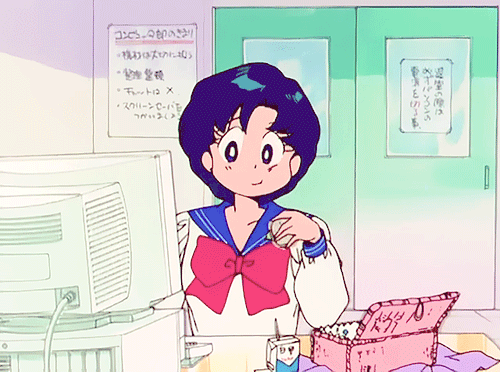
Grammar Point: あまり (amari)
"So much ... That ..."
"To the point that"
When ない form/negative form is used, it becomes:
"Not much"
"Not so much"
The positive form puts emphasis on something done to an excess with negative connotations.
This grammar point is derived from the noun/adverb 余り(あまり)which translates to "remainder", "rest" or "surplus".
余り is also the noun version of 余る. When in a verb form, 余る means "to be in excess", "to remain", "to be too much".
This grammar point will be seen both using the kanji 余り and hiragana あまり。
How to use it:
Positive Form:
Verb (dictionary form) + あまり
Verb (casual, past) + あまり
Noun + の + あまり
Adjective い (み) + の + あまり
Adjective い(さ)+ の + あまり
Adjective な + あまり
Negative Form:
あまり + Verb + ない あまり + Adjective い in ない form (where い becomes くない)
あまり + Adjective な + じゃない/ではない
あまり + Noun + じゃない/ではない 例文
Examples
あまり寒くないよ。It's not that cold.

嬉しさのあまり、彼女は涙を流しました。She was so happy that she cried.
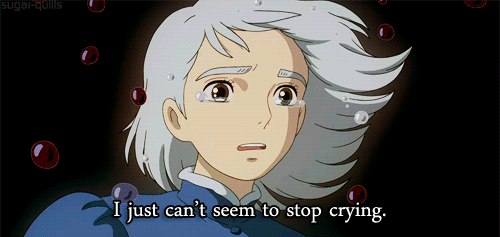
彼は心配するあまり、倒れてしまった。He was so worried that he collapsed.
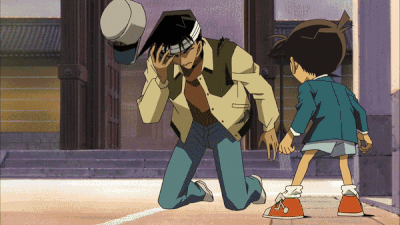
Conclusion
Thank you for reading, and I hope this was somewhat helpful for you!
References
^^For whatever reason, the link wasn't inserting properly for the page on あまり so you can find it as the second grammar point on this list. See you next time!
#japanese#language stuff#language#language learning#study notes#japanese learning#japanese language#日本語#日本語の勉強#日本語文法
24 notes
·
View notes
Text
I want to talk about syllable count in English vs Russian, and I'm going to use "Surface Pressure" as an example because of how fucking horrendous the official Russian translation is, let's go.
So English is a relatively simple language, and a lot of its simplicity is owed to how little various grammarical structures affect the modifications of words.
English nouns aren't gendered and only ever go through a transformation when you add a plural. Car - cars, city - cities, etc. Note that an -s at the end is itself a consonant, and in most cases does not influence the syllable count of the word.
English adjectives don't even have plurals. A fast car - two fast cars. The only modifications occur in comparatives (a fast car - a faster car -the fastest car) or in derrived adverbs (a quick move - to move quickly). All of these add only one syllable most of the time.
Verbs go through the most transformations. I move - I moved - I'm moving, etc. You can pair then with auxilary verbs (I have moved), though again in many cases it doesn't influence the syllable count (I move - 2 syllables, I've moved - still 2 syllables, only a bit more of a mouthful).
Now, there are obviously more complex structures out there, this is just a short sample for comparison. Now let's look at what's going on in Russian.
Nouns in plural typically gain at least one additional syllable. Conpare: cat - cats vs кот - коты. An ы is a vowel. A bitch to rhyme, too.
Nouns have cases. For instance: (this is a) house - дом, 1 syllable; (in the) house - (в) доме, 2 syllables.
Adjectives also have cases, and they match the nouns that they are describing. See: (this is a) big house - большой дом, 3 syllables; (no) big house - (нет) большого дома, 5 syllables.
If you have more than one adjective in a row, all of them have to natch the case of the noun they're describing. See: big pretty house - большой красивый дом, 6 syllables; (no) big pretty house - (нет) большого красивого дома, 9 syllables.
Verbs are even worse. There's no gerund, so every instance of it in English is a separate sentence. For instance: I saw him running - Я видел, как он бежал (lit. I saw how he ran). It's almost always at least two additional syllables, if not more.
Present participles get even longer. I need a separate bullet list just to demonstrate. Compare:
I run (2 syllables) - я бегу (3)
Running (2) - бегущий (3)
Running by (3) - пробегающий (5)
(A girl) running by (3) - пробегающая (6)
(To the boy) running by (3) - пробегающему (6)
And these are just the simplest examples. There are English infinitives that turn into whole Russian clauses (I want you to go - я хочу, чтобы ты ушёл). There are simple, everyday use words that are just longer on average, like:
If (1) - если (2)
When (1) - когда (2)
Which (1) - который (3)
This (1) - это (2)
Why (1) - почему (3)
Because (2) or 'cause (1) - потому что (4)
I could go on. Then there's also the fact that Russian is very phonetically consistent, meaning there's little to no phonetic reduction. You can't y'all'd've your way our of a long ass sentence. You have to work with it.
So here's what you end up with.
On one hand there are Russian-to-English translations that are short on syllables and you have to pull them out if your ass to fill up those bars. Not saying there isn't an occasional tight squeeze - Russian too can be concise and punchy in a non-verbose way - but to me the space within the lines seldom feels too cramped. You may phrase something in an unnecessarily complicated way or add a word that wasn't in the original, but as long as you stay humble and remember your role as a translator, you can do the original justice with minimal errors.
On the other hand you have English-to-Russian translations that always - and I do mean always - have too many fucking syllables. This is arguably much worse. One's ass may very well be a bottomless pit to pull words from, but you can't stuff them back in. Those syllables aren't going anywhere. You have a sentence on your hand and you can't cut any of that sentence without losing a part of its meaning.
If you've been following the logic so far, you're probably asking yourself: so what the fuck am I supposed to do with all those leftover syllables? That's a very good question! I ask it every day. It's agony.
Here are a few methods I've learned to utilize.
Sentence-slicing. Sometimes you can't match the lines exactly, so you step on the next oine until you get obe with some breathing room and "catch up". You can't do this too often or for too many lines in a row because the translation starts to "fall behind", but there are times when you can get away with it.
Wordplay! It's pretty hard to pull off in Russian but you totally can, and it feels amazing when you pull it off. Why use two words when you can use one with a double-meaning?
Use thesaurus. And if that don't work? Use more thesaurus.
Sometimes things will get cut. You must accept it. Not every metaphor can be translated. Not every rhyme can be preserved. Some words will have to be changed. This is very important to understand. A good translator must take responsibility for every meaning they twist. They must analyze the material on more levels than just literal and linguistic in order to accurately transfer it into another language with minimal, acceptable losses. I cannot stress enough how hard and how important this is.
Now, let's talk about "Surface Pressure".
The original lyrics were written by Lin-Manuel Miranda, and I don't fucking care what anyone says, this man got bars. It's kind of a trend to poke fun at Hamilton, but In the Heights won a ton of awards, and nobody fucking says the songs in Moana were bad, do they? Point is, I like his lyrics. They're extremely good. Great job, Mr. Miranda.
The Russian translation I'm going to be tearing to shreds today was, from what I could find with tough fucking luck, made by Disney Character Voices International, Inc.. This is only to say a studio approved it. I'm not harping on, like, one little guy. There were corporate decisions made there.
I'm also gonna compare it to my own translation because I just think that it's better. It's not perfect by any means, but then the bar is already pretty damn low.
With all that out if the way, lets read some lines! Out of order because this is my post and I can do what I want. Exhibit A.
"It's pressure like a drip, drip, drip that'll never stop // Pressure that'll tip, tip, tip 'til you just go pop" is a line from the chorus that gets repeated a few times. I likeit because it's cute, evocative, and alliterative - it creates a particular "beat" sound by using frequent consonant repetitions "drip-drip-drip" and "tip-tip-tip".
The original translation gives us: "Давит тебя вниз-вниз-вниз и всё ближе дно, Давит тебя вниз-вниз-вниз, выплыть не дано" - lit. "Pushes you down-down-down and the bottom gets closer // Pushes you down-down-down, it's impossible to surface". It's not the worst offender but the alliteration is gone to fuck, now it's "down-down-down" in both lines and sounds pretty repetitive.
I did it like: "Давление по кап-кап-капле прижало грудь // Тянет тебя вниз, вниз, вниз, не даёт вздохнуть" - lit. "Pressure by drip-drip-drip(drops) pressed your chest // Drags you down-down-down, doesn't let you take a breath". The first line is actually a wordplay, "кап-кап-кап" (kap-kap-kap) is the sound water droplets make, and "давление по капле" or "pressure by drops" is a lowkey classic metaphor for continuous strain on one's nerves. The line also isn't tautologic because it uses two different words for pressure.
I wanted to keep more of the origial meaning but "pop" did not translate. Couldn't imagine what one would say instead. Хоба? That's so rustic.
If you're thinking "it's not too bad" then we'll get there when we get there. Exhibit B.
"Diamonds and platinum, I find 'em, I flatten 'em // I take what I'm handed, I break what's demanded, but-" is one of my favorite lines in the goddamn song. Notice how the first line has a quadruple rhyme? So fucking crisp and juicy. Fuck yeah!
The original translation gives us: "Тверже бриллианта, сильнее Атланта // Я всем помогаю, я строю-ломаю, но-" - lit. "Harder than diamond, stronger than an Atlas // I help everyone, I build and break, but-" and y'all this is so cringe. What's up with "I help everyone"? It's so childish, it doesn't fit the tone of the song at all. All the rhymes in the second line are verb rhymes which is the laziest, most childish, most unoriginal type of rhyme in the entire goddamn language. Seriously. Silver Age poets are turning in their coffins right now. Good fucking heavens "Строю-ломаю" what a Care Bears ass phrasing. Also, Atlas? Really? Go off ig but I think that's just cause they couldn't find another rhyme for diamond and didn't even try for platinum.
I did it like: "Бриллианты и платина - вызов под стать, а мне // Брать что дают и ломать что некстати, но-" - lit. "Diamonds and platinum are a challenge to match (me), I have to // Take what I'm given and break what's not right (what's amiss, what's unneeded, neither here nor there)". So the quadruple rhyme still couldn't be preserved (sorry Mr. Miranda) but I did manage to rhyme platinum, and I kept the "I take what I'm handed" line in a way, which I feel is very important? Like, in the context of the song? It refers to her literally carrying physical items as a part of her work and to her metaphotically "taking" shit from her family that was pressuring her, and it reads both ways in translation too, it's kind of like "be content with what you're given", it's very in-character, I feel like. I did lose rhymes though. Can't be helped, I suppose.
"It's still pretty okay-" EXHIBIT C:
"Pressure like a grip, grip, grip, and it won't let go // Pressure like a tick, tick, tick 'til it's ready to blow" - another line from the chorus, very good alliteration still, very steady rhythm, very evocative, I kiss this song on the mouth if you even care.
The original translation throws at our face: "Давит тебя вниз-вниз-вниз, это нелегко // Давит это, тик-тик-тик, взрыв уже недалеко" - lit. "Pushes you down-down-down, it's not easy // Pushes means tick-tick-tick, the explosion is already near". I fucking hate "it's not easy" for how stupidly blunt it is, I hate that "tick-tick-tick" no longer has as strong of a metaphorical connection, I hate that they repeat "down-down-down" for the third goddamn time, but y'know what? I could forgive all that if they haven't broken the rhythm. Allow me to illustrate.
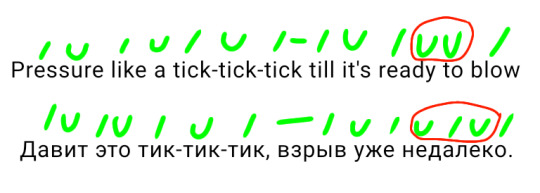
Slashes are stressed, Us are unstressed, the dash is a skipped beat.
Do you see the extra syllable? Do you see it? I see it. I lose my sleep because of it. This isn't, like, a classic translation liberty. This is legit a mistake. They just said Fuck It, Who Give A Shit. Well, I does. I gives a shit
I did the line like: "Давление как взять-взять-взять и держать в тисках // Давит будто тик-тик-тикает и бабах!" - lit. "Pressure like to grab-grab-grab and hold you in a clamp (a vise? what's it called, the scary construction tool) // Pushes as if tick-tick-ticks and kaboom!" So... Ticking is a verb now! And a bit of a wordplay, too. My line is actually one unstressed syllable short but it doesn't break the rhythm because you can, y'know, stretch the previous syllable. Cause it's a song. And you do that in songs. Also the next beat is the one you skip anyway. God, I sound so arrogant but this is just so much better.
So I actually didn't check the official translation at all when I made mine, but there's a part we did very similarly but the official one is just... Clearly worse? Okay, hear me out. Exhibit D.
"Who am I if I can't carry it all? If I falter..."
The original translation presents: "Кто я, если всё не потяну? И вдруг дрогну..." - lit. "Who am I if I can't carry everything? And suddently falter..."
My version is: "Кто я, если всё не потяну? Если дрогну..." - lit. "Who am I if I can't carry everything? If (I) falter..."
Pretty straight-forward but I'll explain. My issue is with the "If I falter" part.
So. Mine is pretty word-for-word, the official one adds a "suddenly" in there. Why, I don't fucking know, but it's not thematically terrible abd doesn't step on the meaning of the line, so whatever. But.
But! I know y'all can't read cyrillics so let me translit that real quick.
First, my version: Если дрогну - Yésli drógnu
Now the other one: И вдруг дрогну - I vdrúg drógnu
This isn't, like, critical, but if you look at the consonants on the second one, it's just VDRGDRG
I mean, fucking hell, right? I'm a native speaker and it's hard for me to say out loud. Why did they feel like it needed to be there? Why did they not just translate literally this one time where a word-for-word translation would fit perfectly? Who thought this soft gentle fade-out part needed to sound like a steel bolt in a cheese grater? Top fifteen questions that keep me up at night.
We're getting to the really bad ones.
So, the verse repeats the phrase "under the surface" a few times and rhymes on it. Like, a lot. It's very impressive and I love it.
Me, I'm a madman who loves pain and suffering, so I translated it as "сказать открыто" lit. "to tell openly" and then stayed up all night rhyming on Ы.
The official translation, however, hates to use its brain, so it went with "на самом деле" lit. "actually" and then rhymed with fucking. Nouns in the same case. Like some type of kindergarten.
I'm gonna list a bunch of lines that use this bit so I wanted to get that out of the way. Now, exhibit E.
"Under the surface, was Hercules ever like 'Yo, I don't wanna fight Cerberus'?" is a line I like for it's rhyme and dislike for something else I'll tell you in a bit.
The official translation smacks me upside the head with: "На самом деле, а мог ли Геракл сказать: 'Подвиги мне надоели'?" - lit. "Actually, could Heracles say 'I'm tired of (heroic) feats'?" which breaks the rhythm again and follows neither the original nor the music, but is overall okay if you don't count how childish it all sounds.
I did it like: "Сказать открыто Геракл не смог бы, что, мол, этот подвиг претит ему." which is actually a wordplay, so a literal translation would do something like "To tell openly, Heracles couldn't (tell openly) that he's sick of this (heroic) feat".
Note how we call him Heracles, not Hercules. That's cause that's his fucking name in the myth.
He didn't fight Cerberus either, he tamed him.
Also my translation follows the beat of the song, at least. Fucking hell of a line.
Okay, ready for the worst goddamn line ever? Meet exhibit F.
"Under the surface, I'm pretty sure I'm worthless if I can't be of service" is a hella powerful line to me personally.
Let me show you my version first this time, it goes like: "Сказать открыто, невыносимо стыдно, что я непродуктивна" - lit. "To tell the truth, (I am) unbearably ashamed that I am unproductive". It's not the prettiest line but it's solid enough.
The official translation curses my fucking bloodline with: "На самом деле, я каждый день недели стараюсь быть при деле" - lit. "Actually, every day of the week I try to be at work". You don't need to speak Russian to notice that within the span of a line these people actually and with full seriousness rhymed "деле" and "деле".
"Well maybe it's just a different word" no it's not.
It's the same word.
They rhymed on the same word.
I actually wanted to add more but Tumblr glitched and posted instead of saving to drafts. I think it's good like that. We're done here.
45 notes
·
View notes
Note
Is a light green shirt - una camisa verde clara, or verde claro?
(Followers feel free to chime in if you have thoughts/opinions)
As far as I know it would be la camisa verde claro
Same with la camisa verde oscuro for "dark green"
In general with colors, claro / oscuro are kept in the masculine form when discussing colors because they modify the colors almost like adverbs, not specifically the article of clothing
In that very specific circumstance it is more common for the actual color adjective to be in gender agreement [if it can be], with the additional modifier oscuro / claro to be left alone
So you'll see el abrigo naranja oscuro "dark orange coat", or las botas azules claro "light blue boots"
But most of the time this is something even native speakers aren't in total agreement over [as in people may still use it even if it's not totally correct but it's less common in the search results]; still people will understand you regardless
[there's also occasionally chances where you can say de color like un abrigo de color azul claro "a light blue coat" more literally "a coat light blue in color" which is also fairly standard; in these cases the colors are considered masculine regardless since they're in an adverbial phrase and won't change for gender or plural... botas de color negro vs. botas negras for example]
Side Note: This is really only for blue but you'll sometimes see azul oscuro as azul marino "navy blue"; and azul claro sometimes as azul celeste "sky blue"; in this case marino and celeste would work the same as claro / oscuro... so los pantalones azules marino "navy blue pants" OR los pantalones de color azul marino
-
On a clothing website though you're more likely to see the colors completely unconjugated because that's sort of just how the categorization works. As an example botas verde azulado will be because you looked up botas then specified verde azulado "bluish-green". Even for standard things you'll see botas then maybe a list of colors offered and it'll be like blanco or negro etc.
I mention it because above is more suited to spoken/written conversations. This is more internet searching where gender/plural rules are sort of suspended because of the nature of search results and categories
34 notes
·
View notes
Text
Toady’s 2024 Book Awards!
I’m obviously not a BookToker, but I do love watching everyone’s reading wrap-up videos and I want to be included, so here are my 2024 reading superlatives!
(Obviously my opinion is my opinion, if you love a book I hated or vice versa then I love that for you)
Total books read: 46
Top genres: Literary, fantasy, classics
Average rating: 3.98
DNFed: 11 (your girl’s a quitter)
Most Surprising: Just Kids by Patti Smith
I’m not a huge fan of Patti Smith’s music, so I didn’t expect to care much about her memoir when it was recommended to me; the thing is though, Patti really doesn’t seem to think of herself as a musician. She’s a deeply flawed individual whose choices I frequently balked at, but who possesses the unique ability to contextualize her own story within a moment in time. 5/5.
Most Disappointing: The Lost Story by Meg Shaffer
Dear fucking god, I hated every second of this. The premise had serious potential, but it was offset by half-assed characterization, clunky dialogue, and baffling narrative and stylistic choices. This is maybe the meanest thing I’ve ever said about a book, but I swear it’s out of love because I truly think this could have been great: this is a classic example of typing versus writing. Meg Shaffer typed an entire book without writing a single thing. I beg you: step away from the thesaurus, read your sentences out loud, and learn how to write a whole person without depending on outside factors to define them for you. 2.5/5.
Wildest Ride: Long Island Compromise by Taffy Brodesser-Akner
This filled the Succession-shaped hole in my heart. I could not have put it down if you’d paid me, which wasn’t surprising considering Brodesser-Akner’s track record. This is an author who knows how to grip you, and while she has you she’ll make sure you’re laughing. It’s genuinely so hard to be funny in writing, but she always manages to make me crack up while simultaneously showing me the most vile, embarrassing, horrifying aspects of humanity. 4.75/5.
Most Controversial: The Salt Grows Heavy by Cassandra Khaw
Okay hear me out. I hated this, but not because it was bad. It wasn’t bad, the premise and plot were interesting and I was impressed that Khaw was able to pace the novella so efficiently, especially because horror tends to want more context than that format allows. The thing I hated (and I do seem to be the only one, so forgive me) was the prose. Every single sentence reminded me of those “Things That Sound Like They Came From the Bible But Actually Came From Tumblr” posts, and while a lot of people seem to enjoy that style of writing, I found it to be completely bogged down in itself. Untangling the mess of adverbs was so tedious that I almost couldn’t follow the plot, and what sucks is that the over-writing really served no purpose. 2.5/5.
I Feel Like I’m Taking Crazy Pills: The Book of Doors by Gareth Brown
I have never felt so gaslit by a book in my entire life. The bookish internet would have you believe that this is top-tier worldbuilding, characterization, etc etc etc but I am here to tell you that the entire thing is ass. I couldn’t actually believe how ass it was. And still I see people putting this on their “Best of 2024” lists as if it was anything but shit from a butt. Rated 3/5 stars for the “twist” at the end, but honestly this is a 1-2 star book.
Best Contemporary: The Book of Love by Kelly Link
This did not work for everyone. That’s completely understandable. Parts of it were questionable to me too. However. I was so gripped by Link’s writing style, her depth of character, and the freaky, uncanny charm of the world she’d created that I forgive the more depraved parts of the plot in what I think is a testimony to the fact that, in writing, craft matters. This book pulled me into itself by force; it had been a long, long time since I’d been so engrossed, and I immediately felt like a little kid again, reading late into the night even though I knew I’d be a mess the next day. 5/5.
Best Classic: Stoner by John Williams
This book put words to feelings I didn’t know there was even language to express. I’m stunned that it’s not considered a foundational text in the canon of English literature; having read it, I feel like I can trace the origins of everything from The Holdovers to The Secret History. 5/5.
My Favorite, But: The Ministry of Time by Kaliane Bradley
Okay so the writing is occasionally cringe, yes. Also, it’s weird that the love interest is a real historical figure. Totally. The main character is irredeemable for sure, and the ending is wack. Every single critique of this book is completely valid and I don’t disagree with any of them. And also this is hands-down my favorite book of the year. Nothing I’ve read since has compared, it was like a super-intense dopamine hit that I’ll never be able to attain again. It’s wildly smart, painfully self-aware, genre-defying, and somehow it also manages to be extremely fun and sexy. This may not be your favorite book, but if nothing else it will keep you on your toes. 5/5.
Honorable mentions: Fleishman is in Trouble by Taffy Brodesser-Akner, The Orchard by David Hopen, The Talented Mr. Ripley by Patricia Highsmith, Where Angels Fear to Tread by E.M. Forster, Erasure by Percival Everett, and The Heart in Winter by Kevin Barry
Dishonorable mentions: The Magicians trilogy by Lev Grossman, The Bellwether Revivals by Benjamin Wood, Graveyard Shift by M.L. Rio, and Magic for Liars by Sarah Gailey
#i love to talk and i want to be included#the booktokers the booktubers and toady too if it’s not too much trouble thanks guys#there were so many books this year that were just not memorable i’m afraid#but these ones stood out for whatever reason enjoy mwah!#toady talkin
6 notes
·
View notes
Note
3, 6 and 17 for the ask game!!
THANKS ANT THIS WAS SO FUN! :D And I'm still very much accepting writer asks if anyone else wants to send me one, or reblog the list and I'll send you something. <3
3 How do you feel about your current WIP
You know, I'm definitely in that phase of writing Rabbit Heart where I'm too close to it to tell if it's successful in what I'm trying to do, but I'm having a lot of fun with the fic, so that's probably a good indicator!
Dooku and Rael are a BLAST. It's also been eye-opening to write Dooku this young, unsure of himself, with so much to prove. Meanwhile, Rael is feeling just as clueless and lost, but it's coming out in totally different ways, with him trying to push Dooku into giving him the reaction he's dreading.
And then - Dooku and Sifo-Dyas. They're circling each other, boys in newly men-shaped bodies, still playing out the dysfunctional dynamic from their backwards-ass childhood with Lene Kostana. I have written a half dozen iterations of Sifo-Dyas quietly gayly pining for an oblivious Dooku, and this fic I wanted to do differently: I wanted Dooku to fall in love with his friend in real time. Dooku being the initiator, even if it seems clear Sifo-Dyas has loved him forever before this. And that's fun and weird, because I write Dooku as someone not always very in touch with himself in matters of the heart, so he's flailing a little bit, trying to understand why suddenly things have changed, trying to frame his feelings around what has happened to Sifo-Dyas in the larger plot and his reaction to it.
6 the word that appears the most in your current draft
Hah, unsurprisingly, "Dooku" followed by "Sifo-Dyas" and "Rael." Most everything else was articles.
17 talk about my writing and editing process
WILL I EVER :D My favorite!!!!
While I don't typically finish stories before I post them, I do tend to prewrite quite a lot before I feel comfortable starting to post any part of it. I write a lot more than I ever post, including whole scenes or alternate endings or different POV characters for a certain plot point than I end up going with. (And lets be honest, sex scenes, I write a TON more sex than I post because of garden variety horniness.) So I gush out all this content and then I have to decide what goes in, what gets scrapped, what gets saved and recycled for later.
I spend a lot of time rereading and narrowing down the content throughout the writing. But when I have the shape of a chapter that I'm pretty much ready to post, I pour myself a big glass of wine and get out my ruthless choppers. I KNOW I overwrite, so this is an important part of my process. I take out the third, unnecessary adjective that of course I've included. I try to kill any darlings that aren't serving the plot. I try to rein in my runaway adverbs, which are fine to use, but I like to have about twenty more of them than I need. I cut the rambling anecdote my characters love to think back on.
I take a hard look at my characters to make sure they feel true to my interpretation of their core qualities. This is usually the part where I fix Sifo-Dyas's lines, since he's often my problem child there. For example, recently in this stage, I changed his "I'm afraid of being left behind" to "I won't be left behind," which is more in line with one of my tenants of writing Sifo-Dyas: that he is defiant and dynamic about facing his own limitations, not ever static or despairing. (Where as Dooku, god love him, can absolutely be a brooder.)
#writing process#my fics#charm stuff#not that Sifo doesn't have his flaws too#in fact “write Sifo-Dyas with more flaws” is one of those things I have on a notecard in my brain#sarcastic little shitboy with an attitude problem who looks at the walking personality flaw that is Dooku and unironically likes him
7 notes
·
View notes
Text
How to write: actually writing
as in like what makes your words sound good
I have three tenets of writing I follow: clarity, depth and beauty. These are mostly for essay/report writing though, but they work in fiction too.
Clarity: how easy your writing is to understand.
Depth: how interesting it is and how complex your ideas are.
Beauty: how nice it sounds and how elegant it is.
I like to favour Clarity over all else in report writing, then depth then beauty but in fiction it’s not necessary to be bluntly obvious. But take these more generally: you (usually) want the reader to know what is going on.
So, with that done, I am just going to list things in no particular order as they come to mind:
Start a new line every time the person speaking changes. For example
”Hi,” said John. “Hello John,” replied Anne.
It makes it much much easier to read.
There is a bit of a grey area when it comes to actions after dialogue, but typically if it is a character doing the action is not the one talking, I make a new line:
“Hi,” said John. He waved at Anne. ”Hello John,” replied Anne. John walked toward her.
But it’s up to you. The key thing to consider is clarity.
Avoid repetition. This is the easiest way to make writing sound better. This includes both word choices but also phrasing of sentences. Example:
Maria sat down on the couch. She turned on the TV. She opened a bag of chips. She started to eat.
Every sentence went noun (or pronoun) followed by a verb and then any extra stuff (objects, locations etc). It feels dull and heavy.
one way to fix repetition of phrases is by merging sentences:
Maria sat down on the couch and turned on the TV. She opened a bag of chips and started to eat.
Another way is to change the ordering of things:
Sitting down on the couch, Maria turned on the TV. She opened the bag of chips and started to eat.
In this case, I made it so Maria’s name would not be the first thing in the first sentence.
Even small changes can help:
As she sat down on the couch, Maria turned on the TV. Etc...
(Note that in these last two cases, the meaning is slightly altered. Very slightly: it’s been written so the sitting and turning on happens at the same time but in the original it was clearly one after the other. This is not a big deal here but I just wanted to point it out)
Adding embellishments: it helps to add little descriptive things to your writing even if they aren’t strictly necessary. Too much of this sounds silly or over the top but a decent amount helps add flavour. It can also help with avoiding repetition of phrasings because you can really mix things up:
Maria plonked herself down on the couch, feeling it shake with her weight. Stretching her arm out, she just managed to reach the remote without having to get up. She turned on the TV and, with her eyes glued to the screen, she opened her bag of chips and began mindlessly munching away.
Note the extra actions, the use of adverbs and adverbial phrases and the changes in word choices (particularly verbs). By using more evocative language you can convey a better sense of the character’s world. Also I love adverbs anyone who tells you not to use them is full of themselves. Also don't listen to people who say you should only use ‘said’. I love my alternatives to said.
The whole ‘show don’t tell’ idea is a bit overemphasised I think. You can say someone said angrily and it’s not redundant because their words made it clear they were angry. And while it is nice to write something like '“fuck!” he swore, his face turning red.' instead of 'he swore angrily.', you can overdo the 'using actions to explain emotions' stuff. Sometimes a simple sentence is necessary. This goes with the avoiding repetition thing: you need to mix up how you describe things and also sentence length/complexity.
I will be honest and say I prefer my burp and fart sounds kind of subtle. I don't really like BUUUUUUUUUUUUUUUUUUUAAAAAAAAAAAAAARRRRRRRRRRPPPPPPPP!!!!!!!s because 1) it’s kind of unrealistic and I like some degree of verisimilitude in my work and 2) it can distract from the flow. Also, I don’t know, it looks childish and silly. To be even more honest, I often like to just write that a person burped and leave it at that. But I think people like the burp onomatopoeia so I make an effort to include them. If you really like massive burps and want them in your writing go ahead. I just am fussy. Also like the reader can kind of make up the sound in their head to be however they want. There’s a nice guide on writing this stuff from @belliesandburps over here. I think it does a good job of explaining how to actually write them out in interesting ways. The key thing in my view id you need to be creative and playful with them, don't just plonk them in and call it a day (or at least not all the time).
Be judicious in your use of things. Burps, farts, swearing etc can get a bit boring and meaningless if they’re always there. Note I say judicious and not sparing: sometimes it’s necessary (if a character has indigestion or if their speech is full of swearing (because I mean, I know people who swear every other word, they exist)), but generally I do like to be sparing. It has more of an impact. Also these things can disrupt the writing and make it harder to follow (especially if the burps or farts are massive). I mean I know we’re all reading for the burps or farts, but the story is important too otherwise we’d just write pages and pages of just burp noises.
Sensory language: if you want to add some more flavour to a scene’s description, consider all the senses: sight, taste, sound, touch and smell. Slob stories are pretty much all about the descriptions and this really turns a good story into a great one. If our friend from earlier, Maria, sits on her couch, she feels it shake. But we could keep it going, perhaps she sees a pile of empty soda cans in her favourite spot and she pushes them aside, hearing them clatter to the ground. When she eats the chips, she can taste the salt and grease. I should also do smell but you get the idea.
This is a colon :
it is used either to introduce a list (the table was full of food: chips, ice cream, cake) or as a sort of ‘equals sign’ (It was his favourite food: lasagne). In the ‘equals sign’ case you can replace it with the words ‘that is’ and the sentence should have the same meaning (it was his favourite food, that is, lasagne). It is there to clarify the phrase before or give more detail. Note that the thing after the colon is not necessarily a sentence, it can be just one word, and it shouldn’t be capitalised.
This is a semicolon ;
semicolons are used to separate two sentences which are related; it is essentially just a shorter version of a full stop. The two halves need to be able to stand by themselves (grammatically speaking they’re both independent clauses: they have a subject and a verb) (if you want to learn basic grammar I am happy to teach it but it’s not that important here). You don’t need to ever use a semicolon because you can always use a full stop instead. Often people incorrectly use commas instead of semicolons because they want the sentence to be more flowy than if they used a full stop, but they forget semicolons exist or don’t know what they do.
Commas are used for short markers of pauses. They are often not really necessary (my English lit teacher used to tell me to use more commas because when I would write in Italian you just don’t use them much so I got into a habit of dropping them) but they add clarity. They can often be replaced by parentheses () or em dashes — the em dash is the long dash, not the short hyphen (-) or en dash (–). Those last two are mostly just for compound words (e.g. ready-made or Nobel Prize–winning). I will care if you use the wrong one but most people don’t know the difference.
Read. Read other people’s writing, find what you like and try to copy what they do. Learn what good writing sounds like so you can feel it when you’re writing yourself. Read widely. Find a style you like and develop it. When you start out you might just be slavishly copying someone’s style but eventually you will start to create things and make your own changes.
Write. The only way to get better is to practice. Writing is a muscle and you must exercise it. Luckily for slob writers it’s an exercise that burns very few calories (and it can even be done while eating). Even if you think your writing is shit, that’s ok. After all, a lot of us in the slob kink community are into scat (haha sorry, but seriously if you practice you will get better).
on the topic of practice, the exercise this time is to write a short scene about a slob who sits down to watch TV but gets interrupted by someone at the door. Try to really be descriptive and work on your dialogue skills.
#my writing advice#Also feel free to ignore my advice and write in your own style#styles of writing are unique and personal#you start from one thing and then build it up and over time it develops into something greater and more 'you'
3 notes
·
View notes
Text
Adverbs and Their Types in English
Adverbs are one of the most versatile parts of speech in the English language. They add depth, clarity, and precision to sentences by modifying verbs, adjectives, other adverbs, or even entire sentences. Whether you’re a native speaker or learning English as a second language, understanding adverbs and their types is essential for effective communication. In this blog post, we’ll explore what…
#accent#adverb definition#adverb examples#adverb examples for students#adverb examples list#adverb examples sentences#adverb exercises#adverb fill in the blanks#adverb placement#adverb sentences#adverb types with examples#adverb usage in sentences#adverb usage rules#adverb vs adjective#adverbs for beginners#adverbs in English#adverbs of degree#adverbs of frequency#adverbs of manner#adverbs of place#adverbs of purpose#adverbs of time#american english#british english#common adverbs#conjunctive adverbs#daily prompt#English#English grammar adverbs#English learning
0 notes
Text
spanish checklist for a1 (and slightly a2) level: vocab, grammar etc.
hey!
i have completed covering the a1 level of spanish (and also covered 1/4? or less maybe of a2) so here is a checklist with everything i learnt.
note: at the end of the post there's a link with a google doc where every item on the list is expanded as well as i could expand it (for example, you'll find examples for conjugation etc). if you need to track your progress, please make a copy of it (you won't have access to edit it otherwise).
Greetings and basic introductions.
Personal pronouns (yo, tú, él/ella, nosotros/nosotras, vosotros/vosotras, ellos/ellas) and verb conjugation in the present tense.
Basic vocabulary related to daily activities, family, numbers, colors, food, and common objects.
Describing people, places, and objects using adjectives.
Forming questions with question words (¿qué, quién, dónde, cuándo, cómo, etc.) and question formation.
Demonstrative adjectives (este, ese, aquel) and possessive adjectives (mi, tu, su, nuestro, vuestro, su).
Basic verbs and expressions for expressing likes, dislikes, preferences, and opinions.
Telling time and talking about daily routines.
Talking about hobbies, interests, and free time activities.
Basic vocabulary for locations, directions, and giving and following simple instructions.
Regular and irregular verbs in the present tense, including stem-changing verbs.
Basic prepositions (en, con, de, a, por, para) and their usage.
Formation and usage of the present progressive tense (estar + gerund).
Talking about the weather and seasons.
Expressing frequency using adverbs (siempre, a veces, nunca, etc.).
Basic vocabulary for professions, places in the city, and transportation.
Describing daily routines and activities in the past using the preterite tense (preterito indefinido).
Usage of preterito imperfecto.
Usage of preterito perfecto.
Basic vocabulary for shopping, clothing, and describing items.
Expressing obligation, ability, and necessity using modal verbs (deber, poder, necesitar).
Comparatives and superlatives (más/menos + adjective, el/la/los/las más/menos + adjective).
Talking about future plans using the future tense (ir + a + infinitive).
Basic vocabulary and expressions for traveling and making hotel reservations.
Giving and asking for directions using prepositions of location (a la derecha, a la izquierda, enfrente, etc.).
Basic vocabulary and phrases for ordering food and drinks in a restaurant.
Introduction to indirect object pronouns (me, te, le, nos, os, les) and their usage.
Indirect and Direct objects
here is the link (https://docs.google.com/document/d/1WaB3cIyMbnG5uJneX7dF9PAKfU-CTdicr-QZJBqWKls/edit?usp=sharing)
did it help you? i made it for my revision before i begin classes this september and so far it has helped me a lot so i hope it turns out just as useful for you!
adiós, mar <3
#spanish langblr#spanish studyblr#study blog#study motivation#study tips#studyblr#studyspo#s;panish#language blog#langblr#mar-lang
46 notes
·
View notes
Text
Language of the Regency: Modern Tema
Phonetics and Phonotactics
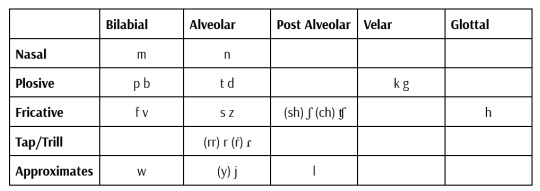
Onset: m n k p ny ŕ ch sh h s th d g w p l rr b t
H Clusters: hw hŕ hl
P Clusters: pr
Nucleus: m n ny rr ŕ y k h v f l b w ch th sk
Coda: n t l ŕ ch
Vowels: a i e o u
A Clusters: aa ao ae au
| | | |
Word Order
Primary - SOV | Subject Object Verb
Ma in-rridi haku lit. I the bird hunted I hunted the bird
Secondary - SVO | Subject Verb Object
Ma haku in-rridi I hunted the bird
Predominantly Head Initial Language
Nouns - Adjectives | Narru naŕa (white river (lit. river white))
Noun - Numbers | Lokal yun (two rocks (lit. rock two))
Noun - Genitives | Mao fisal fiwa (mother’s whiskers (lit. whisker of mother))
Noun - Relative Clauses |
Article - Noun | In rridi (the bird)
Demonstratives - Noun | Avi narru (this river)
Adjective - Adverb | rraheŕi wiwa (pretty stupid)
Yes/No Particles | Post-Sentence
Ma kimakaal, yami I am coming, yes
Question Words | Post-Sentence
Ha otokaal, nyak? Where are you going?
Proper Noun - Common Noun |
Modifier Order | opinion-number-material-size-color-purpose/use
Modifier Example
In sulil rreeŕi teŕ datayame piyuŕe lit. the bowls pretty three wooden small The three pretty small wooden bowls
Compounds | Adjective-Noun
Awataya (forest (lit. place (of)-tree))
| | | |
Noun Class System
Modern Tema retained the group-of-four nouns that initially formed their melting class system, with agreement emerging in both adjectives and articles. As Tema began to be formally recorded and studied by its speakers, with active lessons towards foreigners, they assigned proper names for the four classes.
Solar Nouns (-ŕu) The first noun class originally came from all things good and safe. Made of edible prey, safe and comforting things, familiar friends, close kin and things associated with day-time and toms, its other names are Sun Nouns, Red Nouns and Day Nouns. Regarding family members, swapping them into the Solar class is an indication of closeness or familiarity.
Pat ihŕaŕu (fresh prey) > Fresh, prey that is safe to eat
Hŕan sayaŕu (big deer) > a large, non-aggressive deer
Ka basu piyuŕu (my small den) > my small den that I love
Iŕa aŕa sanyaŕu (the bright sun)
Lunar Nouns (-sa) This second noun class is associated with the moon, contrasting the first class and is made of challenging or frightening things, ethereal feats of nature, intimidation, the night and mollies. It expresses a formal relationship with others and is often used to convey respect and deference to others when spoken.
Hŕan sayasa (big deer) > a large, aggressive deer, perhaps a stag
Ka mao chiŕasa (my kind mother)
Neaŕa sahwasa (a quiet night)
Aaku niskalusa (a careful hunter)
Lightless Nouns (-ye) The third class born from things of great suspicion, danger or prone to causing death or some form of sickness. It absorbed several locations from the previous location classifier that have long since been deemed ‘cursed’ or full of negative energy.
Amuk ayisiwaŕeye (a terrible weasel)
Shuniprri vachiye (a vile kinslayer)
Nyiŕ Choyikal Kaprru (The Skull Lands)
Ayoŕeye (poison (lit. lightless herb))
Mortal Nouns (-ŕe) Named as such to mark an obvious difference from the other three classes, the mortal nouns made of things constructed by mortal paws - being mostly condensed down as ‘tools.’
Chofi piyuŕe (a small pouch/satchel)
Nunei naaŕeŕe (a long tether/leash)
Nabo samaŕe (a hot pan)
Keyinaya malaŕe (an empty waterskin)
In addition to these basic methods of sorting words, Tema allows a little modification to appear on the noun itself to create a simple, concise identifier.
Hŕanuŕu (good/fresh deer (meat)) or ‘a safe or non-aggressive deer.’
Hŕanasa (scary deer)
Hŕaneye (bad/rotting deer (meat)) or ‘a dangerous deer that has killed.’
Listing prey animals while adding a class modifier is usually indicative of the animal being spoken of as prey, with the implication of ‘meat’ being announced while using a separate adjective indicates a living creature.
Hŕanuŕu sayaŕu (large deer meat) vs. Hŕan sayuŕu (a large deer)
Grammatical Number
By now, Tema has officially adopted the paucal number into their paradigm, leaving the singular unmarked.

There's not much to say, so here are a couple of examples:
In aŕasil teŕ piyuŕu | The three small fires
In narruch piyusa | A few small rivers
Tense and Aspect

The discontinuous, -mano expresses that an action or event is no longer true. For example;
Ma in asish matamano | I caught the fish (but I no longer have it)
In this case, the affix -mano implies that though the speaker had once had possession of the fish, this is no longer true. Perhaps the speaker dropped the fish while bringing it in, or they gifted it to someone after catching it. Whatever the reason, the speaker no longer has possession of the fish.
-sahwa (still, unchanging) is still in full effect here. As a reminder, this -sahwa forms the continuative aspect clarifying that an event is still ongoing at the current moment and at least in Tema, had likely been happening for a very long time.
No haku (They are hunt/are hunting)
No hakusahwa (They are still hunting)
In the first sentence, the hunters are merely hunting deer - the implication being that they’ve either left recently or the hunting is happening in a normal span of time. The second sentence implies that the hunters have been out for a long time, long enough to be worth noting or to be a cause of concern.
And of course, combining it with the habitual aspect (hakulisahwa) is still used to express disbelief or incredulity. With the loss of the noun classifiers, the difference between pejorative disbelief (exasperation, annoyance) and positive disbelief (amazement, awe) has become conveyed near exclusively through context and tone alone.
No hŕan hakulisahwa (they are still hunting deer)
Can be meant in either a concerned way (they are still hunting deer (but they should be back by now)), in a way that expresses annoyance and frustration (they are still hunting deer (but we don’t need/want them to)) or in surprise and amazement (they are still hunting deer (even though there’s ample discouragement to)).
Often, the rest of the sentence is enough to convey which meaning is being brought up here:
No hŕan hakulisahwa e in niva koyun aamicheŕu They are still hunting deer and the snow is getting heavier
Here, the speaker is mostly concerned with the safety of the hunters. The deer itself is unimportant, but the fact that they’re still hunting in in-opportune conditions.
Wi oto e no hŕan hakulisahwa We are leaving and they are still hunting deer
In this example, the speaker is irritated by the hunters as their hunting is happening at a bad time. Likely, the group cannot leave the area before the hunters return, and their long hunting trip is holding everyone else back.
Omi ayeŕanit ihŕayiat ilk ŕi Menya e no hakulisahwa hŕan That stag broke Menya’s leg, and he’s still hunting deer
And in this example, the speaker is impressed or incredulous by the hunter - Menya. A stag has previously introduced a higher degree of danger, enough so that the speaker would be inclined to believe that Menya would stop hunting deer for a while, but he did not.
Mood and Modality
Pronouns
The basic independent forms of the basic pronouns have become entrenched in place although, a pair of new words have been attached to the second and third-person singular as a way of expressing formality:


These words came from the association of the royal and noble families as divine guardians of the mortal people, coming from the sheyan (spirit). This change has also been reflected in the dependent markers:

And of course, our example word in the form of yi (to see):

With this in mind, the independent forms are often interpreted as more formal or ‘proper’ speech, clarifying all of the individual parts. It’s sometimes considered ‘childish’ as it’s the way cubs and non-native speakers are first taught to speak the language before moving into the dependent versions.The dependent forms are then thus, viewed as casual or informal conversation.
Ma yanya haku iko ha I enjoy hunting with you (formal) Vs. Yanyama haku iko ha I enjoy hunting with you (informal)
Following along, the formal second and third personal singular forms are extremely form and imply that someone to talking to or about someone of great status, usually the royal or noble family. Interestingly, using the independent formal version is used of the crown heir and the king and queen, while the dependent formal version is used on everyone else in the royal family:
Ma yanya haku iko hayan I enjoy hunting with you (formal/heiress or rulers) Vs. Yayama haku iko hayan (I enjoy hunting with you (informal/nobles, non-inheriting heirs)
Another distinction is the use of both dependent and independent markings when trying to emphasize something:
Ma yanyama haku I enjoy hunting
This sentence for example would read as ‘I really enjoy hunting’ or even ‘I, personally, enjoy hunting’
Articles and Demonstratives
There is no indefinite article in middle mogglish - all unmodified nouns are considered to be indefinite by default:
Maŕo (cat, a cat)
Owninuŕ (rat/mouse, a rat/a mouse)
Chovu (fox, a fox)
The definite article has now been settled into multiple forms that change based on noun class:
Iŕa maŕo (the (safe/familiar/) cat)
Hiŕ maŕo (the (intimidating/unfamiliar) cat)
Nyiŕ maŕo (the (scary/dangerous) cat)
Saŕu sarril (the den)
The demonstratives remain similarly unchanged.

Proximal things refer to nouns close to both the speaker and the listener while distal are things far away from the speaker but often close to the listener.
Avi iŕu narru (this river (near us)) Vs. Ime iŕu narru (that river (near you))
In this example, both of the demonstratives used also fall under the ‘visible’ column - which means the speaker can see the river. This does not however, mean the listener can see the river - the visible and non-visible distinction applies to the speaker alone and sometimes is used as a short-hand when a lost or difficult to find thing has been located:
Avi narru! ((I found/I can see) this/a river (near us))
On the other side of things, non-visible things are - as one might guess - things that the speaker can’t see. It’s also of course, used to remark upon something that the speaker isn’t aware of the location of something.
Rri iŕu narru (this river (that I can’t see/can’t find)) OR Omi iŕu narru (that river (that I can’t see/can’t find))
#the languages of ignavus#the sky regencies#ignavus tema#constructed language#conlang#conlanging#I had/have ideas for grammatical mood but eh...
7 notes
·
View notes
Note
i wanna write fanfics but i'm not sure how to keep everyone in character and to write normal dialogue. do you have any advice? thank you!
Okay so, I've written fanfiction and roleplayed for nine years, and I know it's scary and hard at first, but eventually with enough practice, writing will become as easy as breathing air.
First thing I do is envision the scene in my mind, like a movie! What's the setting? The mood? What kind of characters are here? What's the plot? Materialize all of this in your brain and do not force yourself to make dialogue, it'll come up to you naturally. Think of yourself as the actor for all these characters, feel their emotions, study their motives, backgrounds, passions and even body mannerisms.
If you're dealing with a pairing or characters that correlate with each other, try to think. What are their similarities and opposites? Are they really all that similar or is it one or two few traits? This is where the Venn Diagram comes in! That's the method I've been taught at school, and honestly, I could make a list but the Venn Diagram helps me visualize things better. To be honest I have sharp memory to things I'm fixated in, so I don't do it physically, but it's very useful! And YES, while studying these characters annotate everything that could be useful in writing dialogue.
Do they have an accent? A lisp? Is there any vocabulary depending of where they were raised?
I have things to say about these things in dialogue and the first two are more personal and up to my taste.
Personally when people write "accents" that aren't like Country or Irish accents that actually have different words in the vocabulary, when you replace the letters to make the "sound" and in a way create new words, not only does it look messy, it IS messy to read! It's an unfortunate phenomenon in the Team Fortress 2 Fandom lol.
EXAMPLE: "Viz is not good. Vhat was a vad decision."
For these instances, use regional words and spellings for the dialogue, it says much more than what I've told you. Are they british? Use words like "favourite" instead of "favorite" etc. Trust me, the readers aren't dumb people, you can do ONE paragraph describing that your character has an accent and they would understand.
I think my gripe against that style of writing isn't only aesthetically but also because I'm bilingual (my native tongue being Spanish) so honestly, it would look a little offensive reading a fanfiction where my type of accent is typed like that.
When writing bilingual people ALSO avoid this:
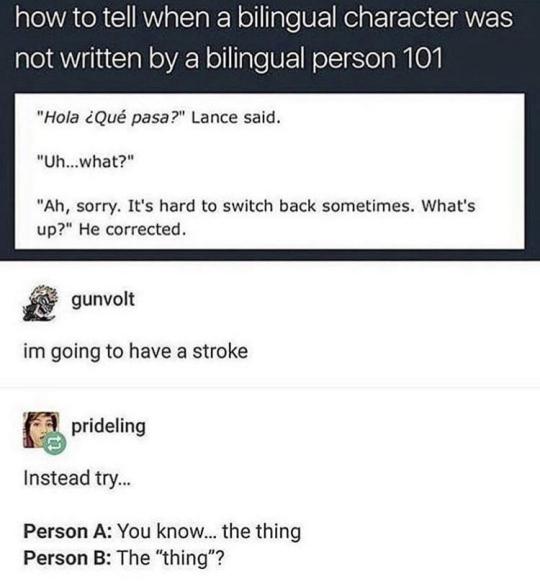
Like prideling said, that one's a big example of what bilingual people do. Even in their own native language! I constantly forget to say "accurate" in Spanish lmao.
And we do not "switch" languages, we aren't Dora The Explorer. We can greet and talk normally to people. Only times I'd say bilinguals happen to jump back at their native tongue accidentally it's when they're surprised? It's happened to me, but for a very short time. Bilingual readers prefer to be represented with the struggles of knowing two languages and showcasing their culture throughout descriptive paragraphs over anything.
Anyway, moving on... DIALOGUE!
This is a classic. Do NOT get comfortable with the verb said. Try using other words like: exclaimed, announced, warned, shouted, whispered, etc!
The more you write, the more you'll learn about these verbs, adverbs and adjectives and it'll come handy tremendously. We don't want to have too much repetition do we?
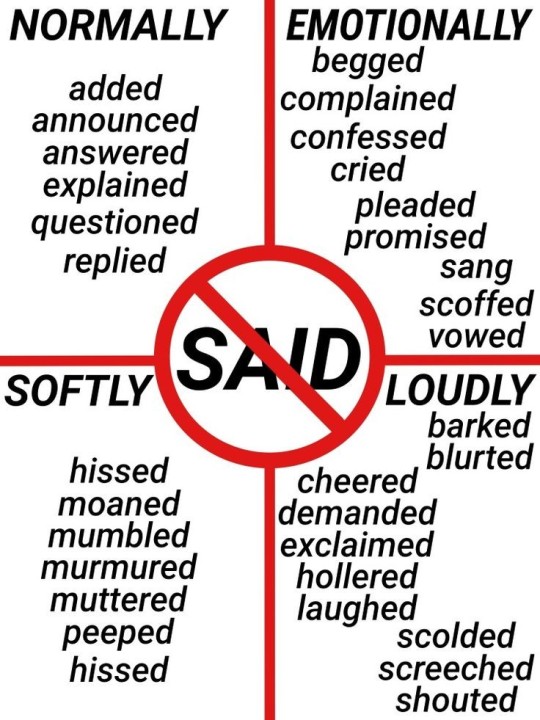
I am also handing you this emotion wheel that will be incredibly useful if you're starting writing:
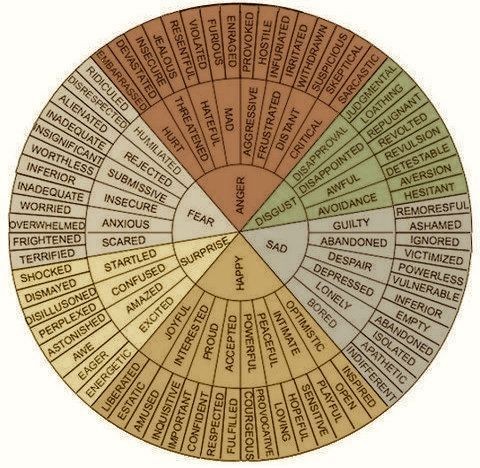
Speaking of repetition... Remember that thing I said about studying your characters? Try to avoid too much repetition of one word between the two characters. As you may have noticed people have a cadence and ways of speaking. If you do that a lot, people will break from the immersion and think it's you who's talking, not the character.
Another classic! SHOW, DON'T TELL.
If you're into writing, you'll probably have heard this saying before. All writers have committed this sin when they started writing, using adverbs and adjectives too obsessively instead of narrating how the character feels.
Is your character anxious? How about instead of doing:
“Fuck! Fuck, fuck, fuck! What am I supposed to do now!?” He anxiously exclaimed.
We do...
“Fuck! Fuck, fuck, fuck!” He tightly gripped onto his jet black hair and ripped it from his scalp into shreds. Pain was the last thing he cared about when a bigger torture was on his mind. His chest constricted, his lungs having less oxygen filled with hot air. The corners of his eyes burned, and his brain constantly banged to the corners of his skull begging to free it from this horrible outcome. The man started to lose his senses, he couldn't smell the horrible stench from his machines, or feel the bottom of his feet anxiously walking in circles, his fingers were getting tingly and numb. Onceler couldn't even see the insides of his destroyed mansion and the deforestation he caused from his window. All of it was a blur and too much too handle, the weight of his actions fell into his mind and stomach, forever scarred and stuck like that last stump in the middle of what used to be a vibrant Truffula Tree forest.
“What am I supposed to do now!?” He scratched his knotted throat as loud as he could, ripping his vocal chords. It didn't matter if he could hear himself now, he didn't listen to his real soul in the past, and now, no one will listen to him now. No matter how much he begged for help.
Alright, that was a little big example there haha! But you get it right? Here's a picture to help you visualize better.
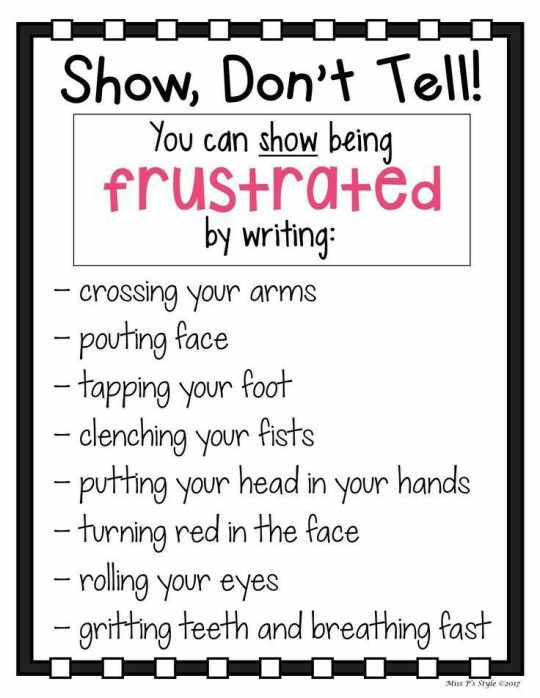
Mind you, the first example isn't bad to use! Just don't constantly use it. It's good to show a story throughout the actions of your character!
Alright, what else... what else... oh yes!
Be mindful of spellchecking bots!
I'll be honest to you, I do use them! They come incredibly handy because sometimes I mess up verbs or I just simply add too many spaces or create typos without meaning to! But remember that bots are bots, and at the end of the day they don't have humanity. They're AI. Therefore, these bots might make suggestions to change certain words because they don't recognize it as part of the vocabulary, but if you do click on everything they suggest, your dialogue will become very robotic and lacking of stylization. Keep those peepers open!
Use a beta reader?
I never had one. To me, writing is a very personal thing and for me to have one, they would have to share the same fandom that I'm writing of to be trustworthy. Beta Readers can be useful because they can point out mistakes other than spelling ones. Something the bots CANNOT do. They can point out weird things in dialogue, plot holes, etc.
Learn of your narration voice.
The way you narrate is your brush strokes of art but in writing! What type of a narrator are you? The unreliable type? The classic? Or just a narrator with a god complex? Have fun with that! And remember, if you want to narrate not as a narrator or yourself but as one of the characters, REMEMBER to study the character. Basically, the first tip I gave you.
Stuttering.
Don't overuse it. And we don't always stutter like: "b-b-but!" NO! Instead, try slurring the words, and adding ellipsis (the three dots ...)
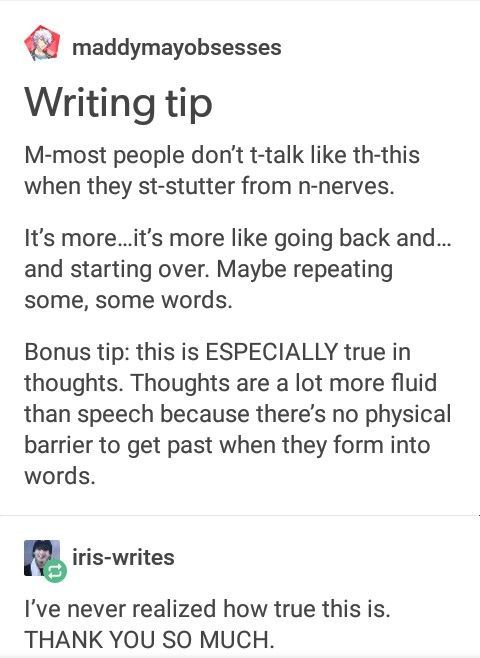
Not only is it more realistic, but it looks better on writing.
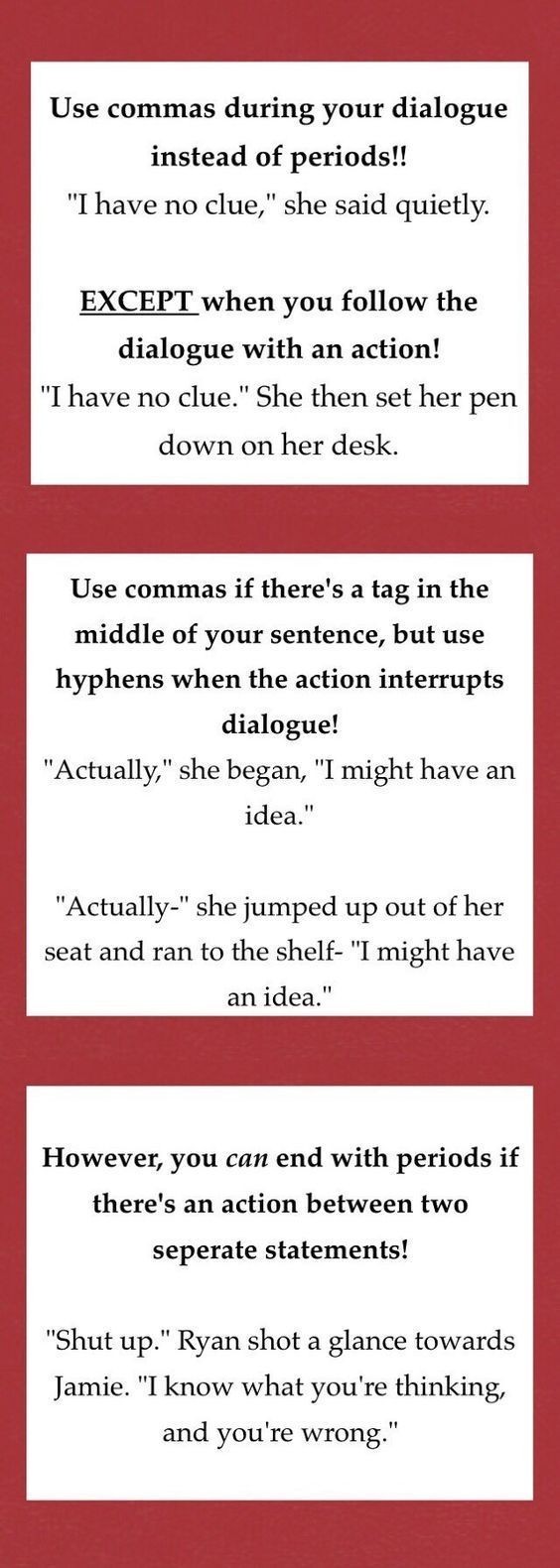
This image is something I struggle with too, but it'll be useful to see it now!
Honestly, my path for writing has been rocky and I raw-dogged this shit, so it's an honor being able to help you! If you ever have any doubts keep coming here! I love to get in more depth, but I've been making this post for like an hour already!
I think that's all I can give you for now! Lots of people that have read my fanfics and roleplays have pointed out that dialogue is my forte! It's rather flattering. As always, I don't give tips or boast about my writing without evidence, so here's a snippet of a Normaler fanfic I'm writing:
“I brought you some things. Water and a towel. Hopefully that's enough.” She handed him the materials and he gladly took them, opening the water bottles and damping the towels.
“Thanks. It's tomatoes. I doubt there's a lot to get me dirty with those.” He chuckled awkwardly, before rushing to rub the towel against his cheek.
Norma smiled, raising her eyebrows.
“I take it that you're a foreigner?”
“You can tell?”
“Your accent. Yeah.” Norma stretched her legs as she sat next to him. “You're one of those cowboys?” She grinned back at the man.
The Once-ler laughed, and my... did he have a goofy laugh. Not what she expected.
“I wish. It sounds like fun, but where I come from, rural life is pretty boring.” He continued to rub the towel against his clothes.
“Greenville doesn't like foreigners.” She explained bluntly. “They always come here with bad intentions.” She furrowed her eyebrows with a teasing smirk, causing the Once-ler to dramatically gasp, a hand on his chest.
“B-But I ain't coming here with bad intentions!”
19 notes
·
View notes
Text
lost in translation (ch 10)
a (non-exhaustive) list of differences or cultural references i noted down for the translation of chapter 10 while watching the chn and eng versions side-by-side. previously i did the same thing for chapter 9.
disclaimer: i am not fluent in chinese, so keep in mind that there will be mistakes. feel free to let me know if you have questions, concerns, or comments.
overall: not too much stood out to me. after looking back on my comments on ch 9, i guess there was less awkwardness in this chapter's translation since i didn't really make a notice things like clunky grammar or sentences. i feel like most of these examples are more like fun facts or nitpicking rather than things i really feel like i need to correct.
rhinoceros horn
心有灵犀一点通, or just 心有灵犀, is a well-known idiom that uses the rhinoceros horn as a metaphor. the idiom definition from the pleco dictionary app:
(idiom) hearts which beat in unison are linked; hearts linked as one, just as the proverbial rhinoceros communicates emotion telepathically through his single horn (idiom); fig. two hearts beat as one
so it can be used to describe people who are connected or very in sync. and here's the description of the rhino horn, also from a pleco definition:
magic horn (i.e. rhinoceros horn with its threadlike white core, mentioned in old texts as having a high sensibility)—heartbeat in unison 身无彩凤双飞翼, 心有灵犀一点通。(李商隐《无题》) Shēn wú cǎi fèng shuāngfēi yì, xīn yǒu língxī yīdiǎn tōng. For bodies no fluttering side by side of splendid phoenix wings, | Between hearts the one minute thread from root to tip of the magic horn. (The second line is often quoted as meaning a meeting of minds.)
the white threadlike core connecting each end of the horn is why it's used as a metaphor for connection; considering this imagery, having the horn hold the wick of a candle also makes perfect sense.
i know the story focused on the role of the rhinoceros horn in 异苑 "Bizarre Gardens", but i'm not familiar with the work so i won't try to add beyond the game's explanation :') i'm just noting the reference that i was aware of
10-1

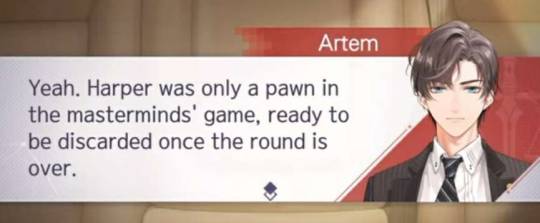
no issues with the translation, but there's a bit of wordplay in the chinese version. translated more literally, it would be something like "and once the round was over, the pawn [棋子] simply became something to be discarded [弃子】." the bolded words are near-homophones, both pronounced "qizi" with just a difference in tone.
10-3
the number four is seen as unlucky in chinese culture (and other east asian cultures) since its pronunciation sounds like the word for "death". by extension, the number 14 is also unlucky, which is why prankster started the "ghost" appearances on the 14th floor of the building.
general note on translation; a lot of times in the narration, short descriptors are lost in the process of chn -> eng, probably since the full translation would make the sentence a bit unwieldy. usually it's not super important or the the meaning that it carries is made redundant through other context. for example, in 10-3, when they're discussing the culprit of the mischief in the office:

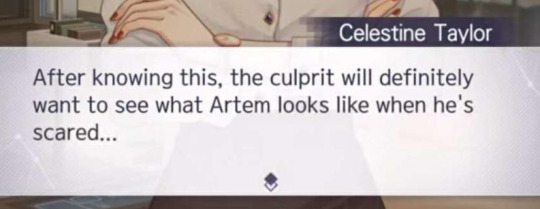
this contains the phrase "artem, who [the culprit] hates". this could be considered redundant through context (because why else would someone be targeting artem in this way?) but in eng, they don't specify this as it does in the original text.
another example in 10-5 when they confront the fortuneteller:

there were a few adverbs dropped from the translation in this section. i picked this one since it had the most change; in chn, she casually glances over it, but in eng, she "inspects" it which sounds much more thorough.
10-13

陆景和一改刚才冷峻严肃的模样,直接不顾形象地斜坐在会议室的长桌上。 Marius changes from his cold demeanor from earlier, and he sits down at the long table in the conference room with no regard for his image.
i... feel like the meaning got flipped to its opposite meaning and it's so puzzling that i'm still wondering if i'm just interpreting it wrong?? hence my typing out the chn text too, so other people can check it as well. i even tried a few different machine translations but this is still my conclusion. anyway, if my analyses so far are correct, this would be the second time that marius's personality becomes a bit harsher after the eng translation (it happened before in ch 9).
10-21

If it weren't for the fact that the copy [of the report] was still there and that it was something I had only mentioned to Artem, I would have thought that he had long since known what I was planning to do next.
also a sentence flipped to basically the opposite meaning, to the point that i doubt myself, but i think this time it's because the sentence is a bit long with a lot of confusing negatives
10-26
When visiting Brigid Gries:



You: Yeah, gege's right! Don't worry, you'll be fine! // [Brigid's writing:] "Thank you, shushu and jiejie" // Without stopping to tease that "shushu", you and Artem exchange a glance.
this is another situation with ways of addressing people in chinese; please check my comments on the scene in chapter 9-14 if you want an explanation of the terms.
rip rosa. you tried xD but looks like artem can't escape the shushu/uncle allegations 😔 and Brigid even called rosa "older sister" right in front of them both... ice cold.
also this time, jerome is just himself shushu

now switching scenes to vyn:

on second thought this might be too trivial, but whatever, we're already here and i have the screenshot and i'm a vyn blog. basically in chinese, vyn "looks up at Matthew Richter with a smile that's not quite a smile." that's pretty much the most literal definition of the phrase, and since it's vyn we can probably already assume that the smile wouldn't be a simple happy one, but yeah. now the last one!

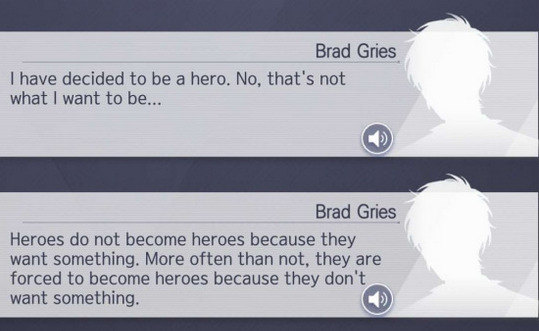
I have decided that I want to become a hero. No, that's not right. It's not that I want to…
revised version leads more naturally into his next sentence as he explains himself. this is actually a nice transition since i'm going to mention this scene again in another post about ch 10, so stay tuned!! and thanks for reading, let me know what thoughts you had about this or the chapter ^^
#tears of themis#tot rosa#artem wing#marius von hagen#tot translation#tot artem#vyn richter#tot vyn#tot marius#lol carefully checking which characters are actually mentioned in this post since there are few (petty) things i hate more than spam taggin#thoughts of themis#ALMOST FORGOT THAT ONE#should i make ''lost in translation'' a tag?? or should i make people just scavenge for those posts on my blog
25 notes
·
View notes